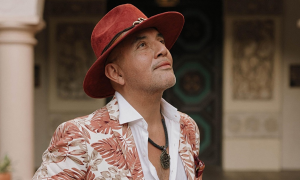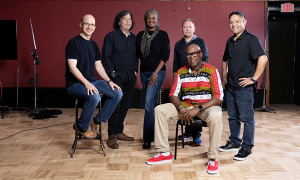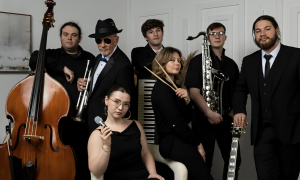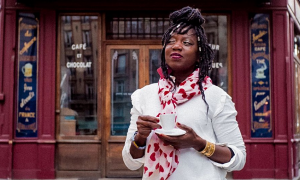Home » Jazz Articles » Take Five With... » Take Five With Bassist / Composer Jakob Dreyer
Take Five With Bassist / Composer Jakob Dreyer

Meet Jakob Dreyer
Jakob Dreyer is a New York City based jazz musician, bassist, and composer. Born and raised in Germany he moved to New York in 2014. He appears on over 30 albums as a sideman, and as a leader he has released two albums on Fresh Sound New Talent: Songs, Hymns & Ballads Vol. 1 and Songs, Hymns & Ballads Vol. 2. Both volumes feature
Jason Rigby
saxophone, tenorb.1974

Jon Cowherd
piano
Jimmy Macbride
drumsb.1991

Steve Wilson
saxophoneb.1961

Jochen Rueckert
drumsb.1975

Mike Holober
pianob.1957
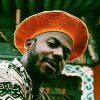
Tivon Pennicott
saxophone, tenorb.1985

Rogerio Boccato
percussionb.1967

Manuel Valera
pianob.1980
Instruments:
My main instruments are double bass and electric bass. I started with piano when I was about five years old, and later also played drums and guitar. Nowadays I rarely perform on any instrument other than the bass though.Teachers and/or influences?
I was very lucky to have had the opportunity to learn from a lot of great bass players, including
Anders Jormin
bass
Martin Wind
bass, acousticb.1968

John Patitucci
bassb.1959

Mike Richmond
bassb.1948

Matt Penman
bass
Hans Glawischnig
bassb.1970

Dennis Irwin
bass1951 - 2008

Ari Hoenig
drumsb.1973

Jeff Ballard
drumsb.1963

Jim Black
drums
Dave Brubeck
piano1920 - 2012

Return to Forever
band / ensemble / orchestra
Abdullah Ibrahim
pianob.1934

Miles Davis
trumpet1926 - 1991

Charles Mingus
bass, acoustic1922 - 1979

Wayne Shorter
saxophone1933 - 2023

John Coltrane
saxophone1926 - 1967

Herbie Hancock
pianob.1940

Joe Henderson
saxophone1937 - 2001

Bill Evans
piano1929 - 1980

Horace Silver
piano1928 - 2014

Charlie Parker
saxophone, alto1920 - 1955

Jaco Pastorius
bass, electric1951 - 1987

Dave Holland
bassb.1946

Chick Corea
piano1941 - 2021

Keith Jarrett
pianob.1945

Kenny Garrett
saxophone, altob.1960

Kenny Kirkland
piano1955 - 1998

Nat Reeves
bass
Jeff Tain Watts
drumsb.1960
I knew I wanted to be a musician when...
I basically always knew. It was the only thing I was ever really interested in or good at.Your sound and approach to music.
My approach is to be open, not to overthink it, and go with what feels good. Sound is something very unique and personal. Everybody sounds different even if they might at times attempt to sound like someone else. For a long time I tried to find my sound only to come to the realization that I always sounded like myself. That being said, I've been told that I sound somewhat similar to
Charlie Haden
bass, acoustic1937 - 2014
Your teaching approach
I don't have a very rigid teaching approach. I think it really depends on the student. The student actually does the learning and as a teachers we have the responsibility to provide resources and advice to facilitate that process. Two things I find important is firstly not to get in the student's natural way of learning and their artistic development, and secondly detecting any blindspots that the student may have, things they subconsciously avoid to deal with.Your dream band
I can think of millions of artists (and combinations of them) that I would like to work with. One combination would maybe be:
Marcus Gilmore
drumsb.1986

Joel Ross
vibraphone
Joe Lovano
drumsb.1952
Road story: Your best or worst experience
A long time ago I was involved in a couple of concerts with an European hiphop band. The first concert was a big concert with lots of people in the audience. They had different jazz musicians joining them on certain songs. On one song they wanted a double bass. The schedule of the songs and who had to be on stage on which song was very complicated. I was young and very nervous and while I was waiting backstage I at some point lost track of the song order. I tried to remember it from the soundcheck and was pretty sure I knew when to go on stage. When I was about to go on stage a stage-manager or stagehand warned me that it was the wrong song. But I insisted on going because I didn't trust that stagehand, and in addition I was already in panic because I knew I didn't have a lot of time to get there and set up and it is very tricky to set up a double bass on a big stage in a short time between two songs. Well of course it turned out the stage-manager was right. I rushed onto the stage in panic mode with the whole double bass and everything at the completely wrong time and everything stopped and everybody looked at me, and there was silence for a moment. It was very awkward, haha.Favorite venue
I like venues like Ornithology, Smalls, and Mezzrow, those basic types of jazz clubs where a lot of musicians hang out.Your favorite recording in your discography and why?
My favorite recording in my discography is Songs, Hymns & Ballads Vol. 1 & 2 which was just released recently. Those are actually the only recordings I released under my own name and they feature some of my favorite original compositions that I composed throughout the years played by some of my favorite musicians. The band consists of Jason Rigby on tenor, Jon Cowherd on piano, and Jimmy Macbride on drums. One thing all songs on the two records have in common is a simple melody that can be easily remembered and sung.What do you think is the most important thing you are contributing musically?
I would say the most important things are: the way I'm playing, my sound, my personality, my choices, the way I understand and interpret music, and my compositions.Did you know...
I'm currently a little bit obsessed with tennis, I play a lot and I also play competitively in a tennis league.The first jazz album I bought was:
The first album I bought by myself was actually a 4-CD set with Miles Davis' Workin,' Cookin,' Relaxin,' Steamin'. I absolutely love these recordings to this day, so it was a good investment.Music you are listening to now:

Walter Smith III
saxophone, tenorb.1980

Mark Guiliana
drumsGenevieve Artadi: Forever Forever (Brainfeeder)

Brian Blade
drumsb.1970
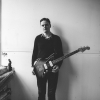
Olli Hirvonen
guitarDesert Island picks:
Wayne Shorter: Speak No Evil (Blue Note)Miles Davis: Nefertiti (Columbia)
Miles Davis: Kind of Blue (Columbia)
Charles Mingus: Mingus Mingus Mingus Mingus Mingus (Impulse!)v Bill Evans: Sunday at the Village Vanguard (Riverside)
How would you describe the state of jazz today?
I think it's surprisingly good. There has never been such a great number of well-trained jazz musicians ever. Also there's a great variety of different styles and really great creative music. The respect the public has for jazz/jazz musicians and improvised music/musicians versus classical music/musicians has grown considerably. Every conservatory now has a jazz program. When I first went to music conservatory it wasn't possible to just study jazz bass it was required to study at least both jazz and classical bass. The classical musicians were sort of laughing about the jazz musicians. This has all changed a lot since then.What are some of the essential requirements to keep jazz alive and growing?
For me, the local jazz scenes with all those countless great musicians are the very heart of jazz music. That's where all the learning, experimenting, and innovation happens, and where all the players come from who do something new, become famous, or commercially successful. In order to have this quality, creativity, and innovation, I think it's very important to have all those various types of players in local scenes who play all sorts of styles like bebop, free-jazz, microtonal odd meter jazz or whatever else that is not exactly popular. I think some things that are important are: to have a lot of young people who are interested in jazz and want to play jazz, to have venues for them to perform at, and it has to be possible for them to make a living. So you need to educate young people in schools, there has to be some support for venues, musicians have to be paid fairly. There has to be support for individual musicians who are in need, for musicians that can't work for whatever reason, and so on. Support for projects, tours, recordings etc. The good news is that a lot of this stuff does already exist. But there is a lot of room for improvement I think.What is in the near future?
I'm going to play at the Jazz Gallery with drummer
Mareike Wiening
drums
Rich Perry
saxophone, tenor
Glenn Zaleski
pianob.1987

Alex Goodman
guitarb.1987

Tim Chernikoff
pianob.1988
What is your greatest fear when you perform?
I would say the fear comes into play not so much while I perform, it's more before, because of all the things that can go wrong before you even play a note. For example with traveling and so forth.What song would you like played at your funeral?
I'm tempted to say I don't care because I won't be listening to it, haha. On the other hand, when I try to imagine the people attending my funeral (I'm assuming they're going to be sad) do I want the music to cheer them up, or do I want them to tear up and cry? Ok probably I want the latter of the two, haha. So in that case I would probably go with "That's where you are" by Knower, or Chopin's "Etude Op. 10, No. 3."What is your favorite song to whistle or sing in the shower?
I don't have a favorite song, it's usually the last thing I listened to before I took the shower.If I weren't a jazz musician, I would be a:
A tennis player. :-)If I could have dinner with anyone from history, who would it be and why?
Maybe someone like Johann Sebastian Bach. I don't know, sometimes I wonder what type of person he was. With a lot of more modern artists you have footage and interviews and so forth, so you can get a basic Idea of how these people were like. But if you go further back there's not much at all, even pictures are not very accurate.If I could go back in time and relive an experience, what would it be?
A long time ago when I was living in Europe I was playing in this big band and I got to play a couple of songs with
Benny Golson
saxophone, tenor1929 - 2024
What are your biggest influences as a composer?:
Wayne Shorter, Thelonious Monk, Herbie Hancock, Kenny Wheeler, Charles Mingus, John Coltrane, J.S. Bach, Joe Henderson, Chick Corea.Tags
Take Five With...
Jakob Dreyer
AAJ Staff
Jason Rigby
Jon Cowherd
Jimmy MacBride
Steve Wilson
Jochen Rueckert
Manuel Valera
Anders Jormin
Martin Wind
John Patitucci
Mike Richmond
Matt Penman
Hans Glawischnig
Dennis Irwin
ari hoenig
Jeff Ballard
Jim Black
Dave Brubeck
Return To Forever
abdullah ibrahim
Miles Davis
Charles Mingus
Wayne Shorter
John Coltrane
Herbie Hancock
Joe Henderson
Bill Evans
Horace Silver
Charlie Parker
Jaco Pastorius
Dave Holland
Chick Corea
Keith Jarrett
Kenny Garrett
Kenny Kirkland
Nat Reeves
Jeff "Tain" Watts
Charlie Haden
Marcus Gilmore
Joel Ross
joe lovano
Walter Smith III
Mark Guiliana
Brian Blade
Olli Hirvonen
Tim Chernikoff
benny golson
Rogerio Boccato
Mike Holober
Tivon Pennicott
Comments
PREVIOUS / NEXT
Support All About Jazz
 All About Jazz has been a pillar of jazz since 1995, championing it as an art form and, more importantly, supporting the musicians who make it. Our enduring commitment has made "AAJ" one of the most culturally important websites of its kind, read by hundreds of thousands of fans, musicians and industry figures every month.
All About Jazz has been a pillar of jazz since 1995, championing it as an art form and, more importantly, supporting the musicians who make it. Our enduring commitment has made "AAJ" one of the most culturally important websites of its kind, read by hundreds of thousands of fans, musicians and industry figures every month.






 Buy Now
Buy Now






